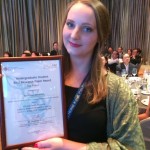
Competition open to all BU undergraduate students and recent graduates
Research skills are central part of all undergraduate and postgraduate studies, and are also a key skill in most career paths. On March 4th 2015, Bournemouth University will be hosting a conference to showcase the best examples of research work from BU’s current undergraduates and recent graduates. As well as having the opportunity to present their research and develop new skills for their CVs, students will also have the chance to win prizes such as a fully funded MSc or MRes at BU, a paid placement and vouchers.
Students and recent graduates are now being invited to submit their applications by the deadline of 20th January. Abstracts should be no longer than 300 words, and could describe a broad range of research activities, such as a dissertation, essay, work for a placement, volunteering or even research undertaken for a student society. The main criteria is that students are able to demonstrate their own critical thinking. All BU undergraduates – from all courses and faculties – as well as recent graduates are eligible to apply.
To submit your 300 word abstract, register here.
Terms and conditions for the competition can be viewed here.
 Bournemouth University student wins ‘Best Undergraduate Research Paper Award’
Bournemouth University student wins ‘Best Undergraduate Research Paper Award’ Prestigious undergraduate research conference comes to Bournemouth
Prestigious undergraduate research conference comes to Bournemouth British Conference of Undergraduate Research – encouraging students to apply
British Conference of Undergraduate Research – encouraging students to apply










 REF Code of Practice consultation is open!
REF Code of Practice consultation is open! BU Leads AI-Driven Work Package in EU Horizon SUSHEAS Project
BU Leads AI-Driven Work Package in EU Horizon SUSHEAS Project Evidence Synthesis Centre open at Kathmandu University
Evidence Synthesis Centre open at Kathmandu University Expand Your Impact: Collaboration and Networking Workshops for Researchers
Expand Your Impact: Collaboration and Networking Workshops for Researchers ECR Funding Open Call: Research Culture & Community Grant – Apply now
ECR Funding Open Call: Research Culture & Community Grant – Apply now ECR Funding Open Call: Research Culture & Community Grant – Application Deadline Friday 12 December
ECR Funding Open Call: Research Culture & Community Grant – Application Deadline Friday 12 December MSCA Postdoctoral Fellowships 2025 Call
MSCA Postdoctoral Fellowships 2025 Call ERC Advanced Grant 2025 Webinar
ERC Advanced Grant 2025 Webinar Update on UKRO services
Update on UKRO services European research project exploring use of ‘virtual twins’ to better manage metabolic associated fatty liver disease
European research project exploring use of ‘virtual twins’ to better manage metabolic associated fatty liver disease